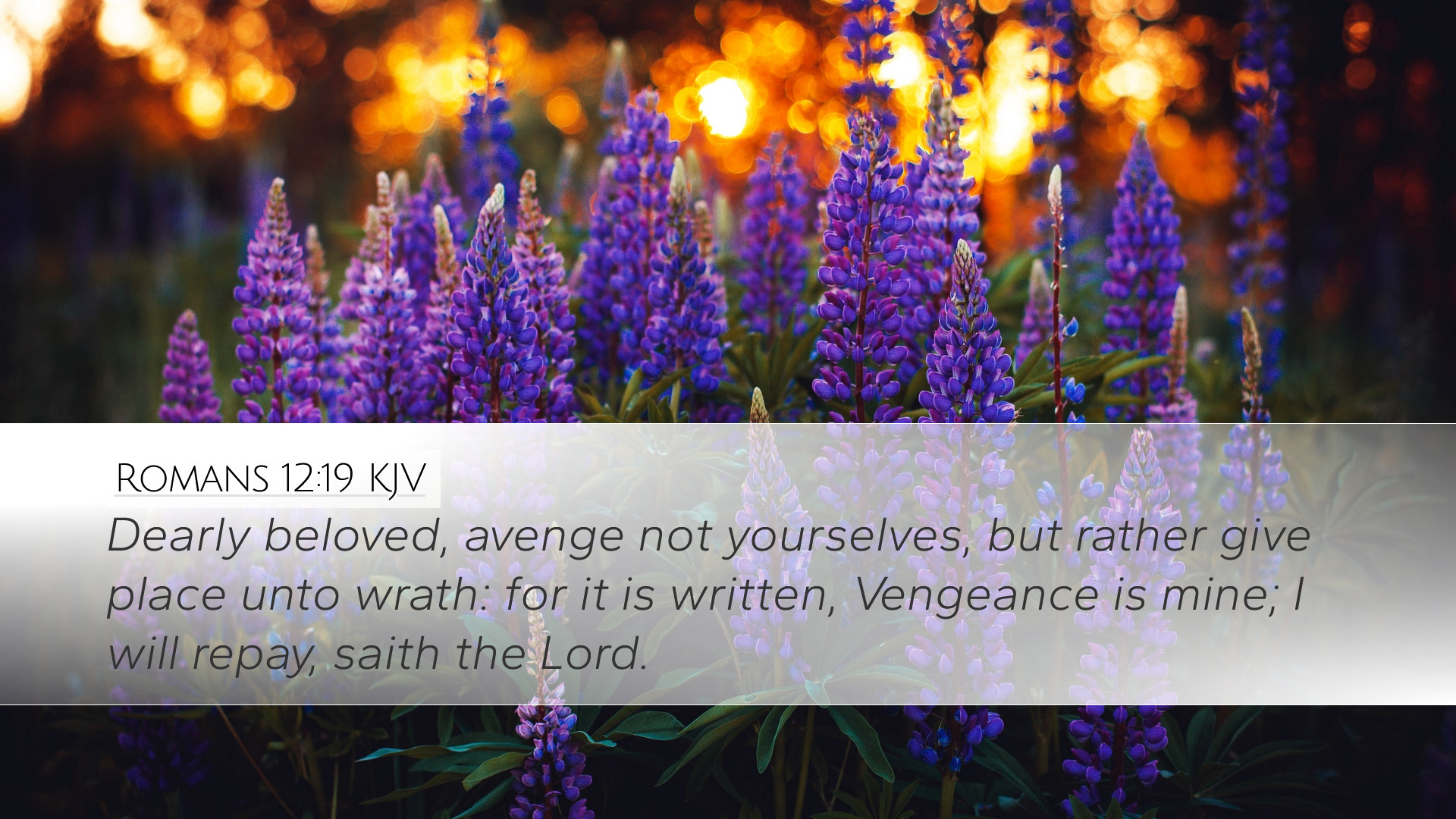Old Testament
Genesis Exodus Leviticus Numbers Deuteronomy Joshua Judges Ruth 1 Samuel 2 Samuel 1 Kings 2 Kings 1 Chronicles 2 Chronicles Ezra Nehemiah Esther Job Psalms Proverbs Ecclesiastes Song of Solomon Isaiah Jeremiah Lamentations Ezekiel Daniel Hosea Joel Amos Obadiah Jonah Micah Nahum Habakkuk Zephaniah Haggai Zechariah MalachiRomans 12:19
Romans 12:19 KJV
Dearly beloved, avenge not yourselves, but rather give place unto wrath: for it is written, Vengeance is mine; I will repay, saith the Lord.
Romans 12:19 Bible Commentary
Commentary on Romans 12:19
Romans 12:19 states:
"Dearly beloved, avenge not yourselves, but rather give place unto wrath: for it is written, Vengeance is mine; I will repay, saith the Lord."
Contextual Overview
This verse serves as a pivotal anchor in Paul's discourse on Christian ethics and community dynamics among believers. Following a call to genuine love and sincere adherence to goodness, this directive emphasizes reliance on divine justice rather than human retribution.
Exegesis and Analysis
Matthew Henry's Insights
Matthew Henry asserts that this verse reflects the core principle of trusting God's justice over our instincts for revenge. He elucidates that vengeance belongs solely to God and it is both unwise and sinful for believers to seek personal retribution. In practical terms, this admonition calls believers to exercise patience and to allow God's providential hand to deal with their adversities.
- Devotion to Justice: Henry emphasizes that the desire for personal revenge can cloud one's spiritual judgment. Instead, believers should cultivate trust in God’s promise of justice.
- The Nature of Wrath: The term "wrath" conveys not only divine anger but also the need for believers to step aside and let God's purpose prevail.
Albert Barnes' Commentary
Albert Barnes elaborates on the philosophical underpinnings of this text, addressing the human inclination towards an unrighteous desire for vengeance. Barnes notes:
"If I take revenge into my own hands, I am not acting as an instrument of God's justice, but as a mere man driven by his passions."
He draws attention to the scriptural foundation of this verse, referring to Deuteronomy 32:35, where God asserts that He is the ultimate arbiter of justice, reminding readers that our struggle is to live righteously in a world that often promotes retaliation.
- Divine Retribution: Barnes reinforces that God's timing for justice is perfect, contrasting human impatience.
- Principle of Forgiveness: He urges the faithful to extend grace, revealing that true strength lies in forgiveness and restraint.
Adam Clarke's Perspective
Adam Clarke’s interpretation emphasizes the moral imperative found in this verse—and the broader theological implications it carries. Clarke elaborates on the phrase "give place unto wrath," indicating a necessary relinquishing of personal grudges to allow God's wrath to manifest:
"To withhold personal vengeance is a step towards peace and reconciliation, both for the individual and the community."
Clarke also emphasizes the importance of communal harmony, highlighting that internal divisions often arise from unresolved conflict. He encourages an understanding that vengeance impedes spiritual progression and fosters divisiveness.
- Humility and Trust: Clarke circles back to the notion of humility—a believer must humble themselves under God’s judgment rather than presumptuously attempt to usurp it.
- Benevolence Over Retribution: He calls for acts of kindness and generosity towards adversaries as a testament to one's faith.
Theological Implications
This verse underscores a foundational tenet of Christian theology—the concept of God’s sovereignty in justice. It draws believers back to an understanding of their place in God's redemptive plan, encouraging them to refrain from actions that disrupt communal peace.
Practical Applications
For pastors, theologians, and scholars, this verse is a profound reminder to embody patience and humility in ministry.
- Preaching Forgiveness: Use this verse to preach the importance of forgiveness and reconciliation within communities.
- Teaching About God’s Justice: Encourage a deep understanding of God's justice as a comfort for those who feel wronged.
- Personal Reflection: Challenge congregants to reflect on their own struggles with anger and revenge, inviting them to trust in God’s timing.
Conclusion
In conclusion, Romans 12:19 challenges believers to relinquish the desire for personal vengeance, pointing them towards the ultimate justice of God. The insights from public domain commentaries—led by voices such as Matthew Henry, Albert Barnes, and Adam Clarke—deepen our understanding of this exhortation, inviting believers to live lives characterized by grace, patience, and trust in divine justice.


